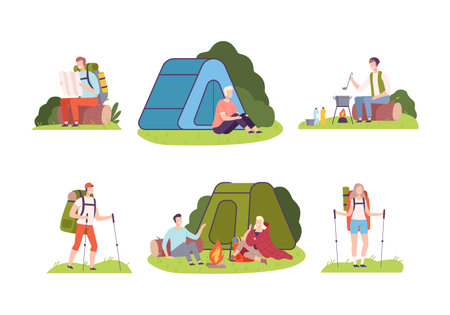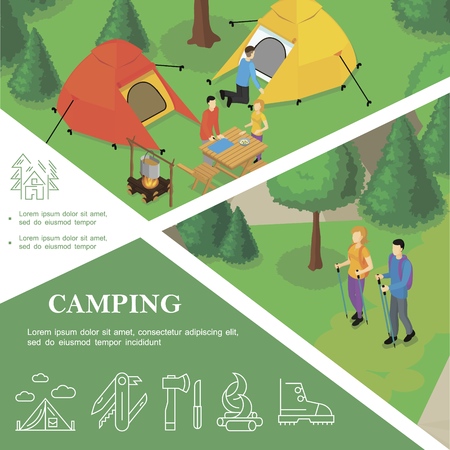Introduction to Camping Grills in the UK
There’s something truly magical about gathering your family in the rolling hills, ancient woodlands, or serene lakesides of the British countryside. Whether you’re pitching a tent in the Lake District or setting up camp along the Cornish coast, one thing is certain: food tastes better outdoors, especially when cooked over a proper grill. Choosing the right grill isn’t just about convenience—it can shape the entire camping experience for your family. From sudden rain showers to windy moors and bustling campsites, British campers face unique challenges that make the decision between charcoal and gas grills particularly important. For parents, ensuring safety, ease of use, and reliable results means more time spent sharing stories and less time fussing over equipment. In this guide, we’ll explore how selecting the right grill can help families savour every moment together under Britain’s ever-changing skies.
Charcoal Grills: British Traditions and Practicalities
For many families heading out to the lush fields or tranquil woodlands of the British countryside, charcoal grills hold a special place in their hearts. Theres something truly nostalgic about gathering around a crackling fire, reminiscent of classic British summers spent outdoors. Charcoal barbecues aren’t just about cooking—they are about sharing stories, creating memories, and experiencing the timeless ritual that has shaped our national love for outdoor dining.
The Classic British BBQ Experience
Charcoal grilling is deeply woven into UK culture, particularly when it comes to camping and picnics. The unmistakable smoky aroma drifting through the air signals not just food but togetherness and tradition. Many British families prefer charcoal grills for the authentic flavour they impart, giving sausages, burgers, and even veggie skewers that signature taste you simply cant replicate with gas.
Local Preferences and Flavour Impact
Across the UK, preferences for BBQ style can vary by region but the allure of charcoal remains universal. The smoky notes enhance everything from Aberdeen Angus steaks in Scotland to Cornish mackerel along the southern coasts. Here’s a quick comparison of how charcoal grilling influences your food:
| Aspect | Charcoal Grill |
|---|---|
| Flavour | Rich, smoky, traditional BBQ taste |
| Cooking Time | Longer preheat, slower cooking |
| Temperature Control | Requires practice; less precise than gas |
| Cultural Appeal | Nostalgic, communal experience |
Practicalities During Unpredictable British Weather
Of course, no discussion of grilling in Britain would be complete without mentioning the weather! Charcoal grills can sometimes be tricky when rain clouds gather or breezes pick up—getting them lit can be a challenge on damp days. However, with a little patience and some British perseverance (and perhaps a waterproof jacket), many families find the effort worthwhile for that unbeatable flavour and atmosphere. Plus, part of the adventure is huddling together under an awning or umbrella as you wait for your bangers to sizzle!

3. Gas Grills: Ease and Efficiency for UK Campers
For families heading off to the British countryside, gas grills have become a popular choice thanks to their sheer convenience and user-friendly design. With just the turn of a knob, you can have your grill heating up in moments—no need for firelighters or waiting for coals to glow. This speed is especially handy when little tummies are rumbling after a long day of exploring fields and footpaths! Many British campsites are well-equipped to support gas grills, offering level pitches, stable tables, and even designated BBQ areas, making set-up stress-free. When it comes to safety, gas grills also tend to be more predictable than charcoal alternatives; there’s less risk of sparks or flying embers, which is reassuring when camping with children or pets around. Another big tick in the gas grill box is how well they handle the unpredictable British weather. Whether you’re caught by a sudden drizzle or facing a gusty breeze on the moors, gas grills are less affected by wind and dampness—ensuring your sausages and veggie skewers cook evenly every time. All in all, if you value quick meals, easy clean-up, and peace of mind while camping across the UK’s varied landscapes, a gas grill could be your trusty companion.
4. Safety and Environmental Aspects
When planning a camping trip in the beautiful British countryside, its essential to prioritise safety and environmental responsibility, especially when grilling outdoors. Whether you choose charcoal or gas, each grill type comes with its own set of considerations that align with UK campsite rules and the need to protect nature for future family adventures.
Understanding UK Campsite Regulations
Many campsites across the UK have strict guidelines regarding open flames due to fire risk—particularly in dry summer months when local fire bans may be in effect. Always check with your campsite before bringing any grill. Some only permit gas grills because they are easier to control and extinguish, while others may have designated barbecue areas specifically designed for safe charcoal use.
Safety Tips for Charcoal vs Gas Grills
| Charcoal Grill | Gas Grill | |
|---|---|---|
| Fire Risk | Higher—embers can escape, especially on windy days | Lower—flame is contained but still requires care |
| Setup & Supervision | Needs careful placement and constant supervision | Easier to control; instant shut-off available |
| Extinguishing | Takes longer; must fully douse coals before disposal | Quick—simply turn off the gas supply |
Eco-Friendly Grilling Practices
The UK countryside is home to delicate ecosystems, so following eco-friendly grilling practices is a must:
- Use natural lumpwood charcoal from sustainable sources if choosing charcoal.
- Avoid disposable barbecues, which are often banned due to their high fire risk and environmental impact.
- If using a gas grill, check for leaks before use and carry out regular maintenance to avoid wasteful gas consumption.
- Dispose of ashes only in designated bins after ensuring they are completely cool.
Teaching Children Responsible Outdoor Cooking
Involving children in safe and green grilling helps nurture respect for nature. Encourage them to help with setup under adult supervision, explain why certain rules exist (like keeping grills off the grass or away from tents), and share stories about how every little action helps keep our countryside clean and welcoming for other families.
5. Cost and Availability in the British Market
When planning a family camping trip in the British countryside, keeping an eye on your budget is just as important as choosing the right grill. Let’s take a closer look at how charcoal and gas grills stack up in terms of price and availability across UK shops and popular outdoor retailers.
Charcoal Grills: Affordable & Widely Available
If you pop into any high street retailer or browse online, you’ll notice that charcoal grills are generally more affordable upfront. From classic kettle barbecues found at Argos to portable bucket grills at B&Q or Wilko, you can often pick up a decent model for under £40. Disposable charcoal trays are also available in most supermarkets—ideal for spontaneous camping trips or if you want to keep things simple and cost-effective.
Gas Grills: Higher Initial Cost, But Convenient
Gas grills, especially portable models suitable for camping, tend to have a higher initial price tag. Expect to pay from £60 upwards for a basic portable gas BBQ at retailers like Halfords or Go Outdoors. You’ll also need to factor in the cost of gas canisters, which are widely available but add to your running costs. However, their quick start-up and consistent heat can be a real bonus when cooking for hungry children after a day exploring nature.
Availability Across the UK
Both types of grills are easy to find, with big names like John Lewis, Tesco, and Decathlon stocking a range of options. During summer months or just before bank holidays, it’s wise to shop early as popular models can sell out quickly. Charcoal and fuel refills are stocked by most petrol stations in rural areas, while gas canisters may require a stop at an outdoor specialist or garden centre.
Family Budget Considerations
For families looking to balance cost with practicality, charcoal grills offer great value for occasional campers who don’t want to invest heavily. Gas grills, on the other hand, might be worth the extra spend if you camp regularly or appreciate the ease of use—especially when cooking larger meals together as a family. Whichever you choose, there’s an option out there to suit every family’s camping adventure and budget.
6. Which Grill is Best for Your Family Camping Adventure?
When it comes to choosing between charcoal and gas grills for your family’s camping trip in the British countryside, the best option truly depends on your family’s unique needs and preferences. If you cherish the traditional, smoky flavours of a classic British barbecue and enjoy the process of cooking together as a family, a charcoal grill might be just right for you. It encourages everyone to get involved, from gathering kindling to patiently waiting as the coals heat up, making it a delightful bonding activity beneath the open sky.
However, if convenience, speed, and ease of use are top priorities—especially with younger children who may not want to wait long for their food—a gas grill could offer a more stress-free experience. Gas grills provide consistent heat and quick start-up, so you can focus on sharing stories or exploring nature rather than tending to hot coals. In addition, many campsites in the UK favour gas grills due to safety regulations and reduced fire risk during drier months.
Ultimately, think about what matters most to your family: is it the ritual of cooking over glowing embers or the simplicity of pressing a button and getting dinner underway? Consider also how much space you have in your car, the facilities at your chosen campsite, and how comfortable you are managing fuel types outdoors. Whichever grill you choose, remember that every meal shared under canvas becomes part of your family’s story—full of laughter, learning moments, and the unique magic of the British countryside.

